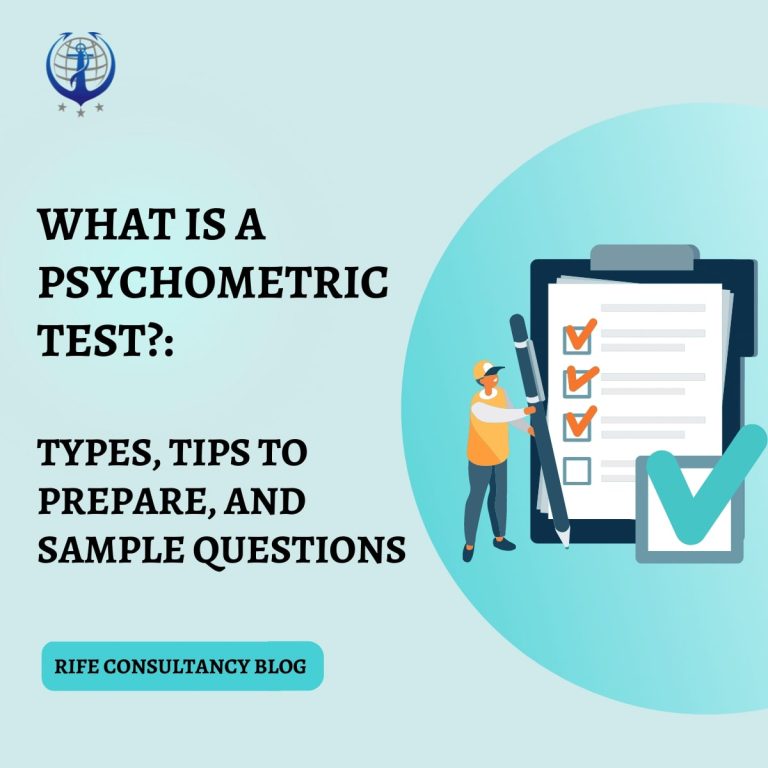
What is a Psychometric Test?: Types, Tips to Prepare, Sample Questions
A scientific subject called psychometrics examines the theories and methods for evaluating personality characteristics and cognitive function using various tests, measures, and models. To evaluate cognitive aptitude, character qualities, and mental health status, the psychometric test is utilized in many disciplines, including education, psychology, psychiatry, merchant navy, and recruiting.
Psychometric testing has evolved into common employment practice over the past several years, and many businesses now use online psychometric assessments in their hiring and recruitment procedures. Using a psychometric test to evaluate a candidate’s skills and qualities may be quite effective. However, it must be utilized with caution and shouldn’t be the main method of assessing their abilities.
In this blog, we’ll walk you through all things related to the psychometric test, its purpose, types of questions asked, sample questions, as well as preparation tips.
Table of Contents
What is a Psychometric test?
A variety of tests created by experienced specialists (psychologists or psychometrics experts) are used in psychometric testing with the objectives to assess the following:
- Cognitive ability: Intelligence, aptitude, skills
- Personal traits: Behaviour, attitudes, values, interests
- Mental health status: To detect potential disorders or conditions
It’s noteworthy to observe that psychometry employs a number of various techniques, including:
- Observation, or observing the person under various circumstances. Observation can be a powerful element of hiring strategy, for example, during job simulations, where the performance of best candidates is tested in your actual work environment.
- Projective techniques require subjects to interpret particular pictures or scenarios, such as the well-known Rorschach inkblot test.
- Personality inventories or capability assessments, or psychometric tests, which typically come as self-assessment tests, are used to measure a person’s abilities, skills, or personal traits.
In other words, while deciding whether to hire you, recruiters evaluate the results of psychometric tests. These exams also assess your ability to handle stress, assimilate information, and collaborate with others. Although paper exams are occasionally conducted, most psychometric examinations are done online.
Why and when is a Psychometric test used?
For the following reasons, recruiters prefer to take psychometric tests:
- They are objective and impersonal, allowing candidates to be compared in ability terms without unconscious bias
- They contribute to the recruiting process efficiency
- They have been shown to be accurate predictors of subsequent job performance
The exams may be administered at any point during the hiring process, but often you will take them at one of these three stages:
- Immediately after you submit your application form
- As an add-on to your interview
- Immediately before or after your actual interview
Psychometric test in Merchant Navy
Psychometric test is a part of the Merchant Navy sponsorship process. While applying for sponsorship of shipping companies, a psychometric test is conducted along with a written test, interview, and medical test.
Each Shipping Company has its own way of conducting Psychometric tests with its own pattern of questions. It is more of a personality and attitude test. This is to assess the candidate’s reaction to different situations. However, Questions related to Mathematical reasoning, analytical reasoning, and logical reasoning could be included.
For e.g. “What you will do if you are asked to do an unlawful task by your superior who handles your performance reports?”. These questions seem very simple (some may seem complex). The intention is to find your real personality, work ethic, and how you will handle situations in real life.
In Merchant Navy, the psychometric test is generally conducted after taking the written test.
Learn more about obtaining sponsorship in Merchant Navy here.
What are the main types of psychometric tests?
Ability tests and personality questionnaires are the two primary categories of psychometric exams. Although there are many other types of aptitude tests, verbal and numerical reasoning exams are the most popular.
- Numerical Reasoning
Outside of personality profiling, numerical reasoning exams are the most common psychometric test, thus it’s critical that you are skilled at handling this type of examination. A candidate’s capacity to analyze numerical data is assessed through exams of numerical reasoning.
You must have the analytical skills necessary to interpret the data, which may be shown to you in tables or graphs. The examinations are primarily intended to evaluate your aptitude for using basic mathematical information to solve problems rather than to evaluate the extent of your mathematical ability.
- Verbal Reasoning
A candidate’s ability to comprehend a passage of text is tested using a verbal reasoning test. Most likely, a written passage will be offered to you, and you will be required to respond to a series of questions by selecting “True,” “False,” or “Cannot Say” based on the information provided. Since they are examining your ability to interpret text rather than your prior knowledge of the subject, you must only use the information that is written in the section.
Also Read: What is the Difference Between Merchant Navy, Indian Navy & Coast Guard
Tips for preparation of Psychometric test
1. Be clear on your task
Learn as much as you can about the testing procedure prior to starting your preparation for your upcoming psychometric examinations. Make sure you understand which exams you must do, when, and where before beginning any psychometric testing sessions with a potential employer.
Better yet, if you can identify the exam publisher because different test kinds range from publisher to publisher. It is recommended to send an email to check if any further data can be shared if the aforementioned information is not mentioned in correspondence regarding the hiring process.
2. Research the test format
There are a number of commonly used psychometric reasoning tests, including numerical, verbal, diagrammatic, logical, mechanical, abstract, spatial, and situational judgement assessments.
Depending on the sort of psychometric test set and the publisher delivering the assessment, your assessment will vary in length, structure, and time allotment. You’ll feel more confident about the task at hand if you are aware of the test’s format, including how many sections, how many questions, and the time allotted for completion.
3. Refresh relevant knowledge that will aid you
Refresh your knowledge of any necessary expertise before your psychometric test to make sure you are properly prepared. Also, it makes sense to review dealing with mathematical ideas like fractions, percentages, sequences, ratios, and fundamental algebra in preparation for a numerical test.
For a verbal reasoning test, consolidate your understanding of appropriate grammar and sentence construction as well as synonyms because you’ll frequently be asked to review and choose the best modifications for a paragraph of text.
4. Become familiar with the style of the test questions
In contrast to most other exams, psychometric tests frequently have questions that are written differently. Also, you can better prepare for the timed test by taking the time to become used to the question format and subject matter.
Reading through sample questions and taking practice tests are the greatest ways to become familiar with the subjects that will be covered. The more tests you take, the less likely it is that the phrasing or requirements of a question will catch you off guard on test day.
5. Learn from your mistakes
When taking practice exams, check your responses thoroughly and note any areas where you are falling short of passing. While it may be easy to give up after a disappointing or subpar practice performance, knowing your strengths and weaknesses is essential to a successful test preparation strategy. To prevent any negative effects on your final score, it is crucial to concentrate enough on your areas of weakness.
6. Take into account any past test experience or feedback
If you have previously taken a psychometric test, try to expand on that knowledge. Consider the elements that worked well, and make sure you have the conditions and information needed to replicate your performance. However you had issues on a previous test then try to solve them right away. Practice enhancing and stabilizing your pace if, for instance, you had trouble with the timing of the examination.
7. Check your tech
Most psychometric exams are taken at home, unless they are a component of an assessment center, and they are given online. Check your internet connection and necessary browser updates to ensure that there are no distracting issues with the screen format, button functionality, or question loading when moving through the live test.
8. Practice pacing yourself
All psychometric exams are timed assessments, even though the number of questions and the amount of time vary from test to test. So, Employers want to see if a potential employee can remain composed and precise under pressure. Rushing through the questions to get to the last ones won’t help because the questions on psychometric tests often have equal weight. Calculate what your working pace should be in order to get ready for the pressure of the actual test and make sure you can accomplish this.
9. Recreate exam conditions
Limiting noise and other distractions will help you concentrate on the questions when completing your practice examinations. By simulating exam conditions in practice sessions, you can be sure that the stillness you experience while taking your psychometric tests at an assessment center won’t be deafening. Practice using the tools that will be permitted on the actual test, such as a calculator for a test on numerical reasoning.
10. Practice with online psychometric tests
The best method to prepare for a psychometric exam is to take several practice tests so that you become familiar with the format, timing, and questions. You should aim to consistently achieve a score in the top range on your practice exams to improve your chances of getting a high score on the real test.
Sample questions asked in Psychometric test
1. Sample numerical reasoning test question
What was the total value of Grade A and C wireless headphones produced in 2019?
- $490,000
- $540,000
- $550,000
- $790,000
2. Sample abstract reasoning test question
Which of the boxes comes next in the sequence?
3. Sample verbal reasoning test question
Statement: Therapists have some flexibility regarding what they deem serious enough to lead them to breach confidentiality.
- True
- False
- Can’t Say
4. Sample inductive reasoning test question
Which image completes the sequence?
5. Sample spatial awareness test question
Which of the boxes comes next in the sequence?
Also Read: Online sponsorship exams for Merchant Navy in 2023: List of companies
Psychometric test preparation course by Rife
At Rife Consultancy, we have curated an in-depth course to help students prepare for their psychometric tests. In addition, specially designed by experts and professors having years of experience in dealing with psychology subjects.
Also, the entire course is divided into short videos that you can refer according to your convenience. In our easy-to-grab, self-paced learning course, the following things will be covered:
1. Basic interview questions and how to answer it
2. Nonverbal communication and its significance
3. Various psychometric assessment tests
A. Word Association Test
B. Self Description Test
C. Thematic Apperception Test
D. Situation Reaction Test
In the last, learn more about the course here. In case of any queries, feel free to reach out to us at admin@rifeconsultancy.com!
Click here to join our Telegram chanel
You will get information, news, and support related to Merchant Navy.



